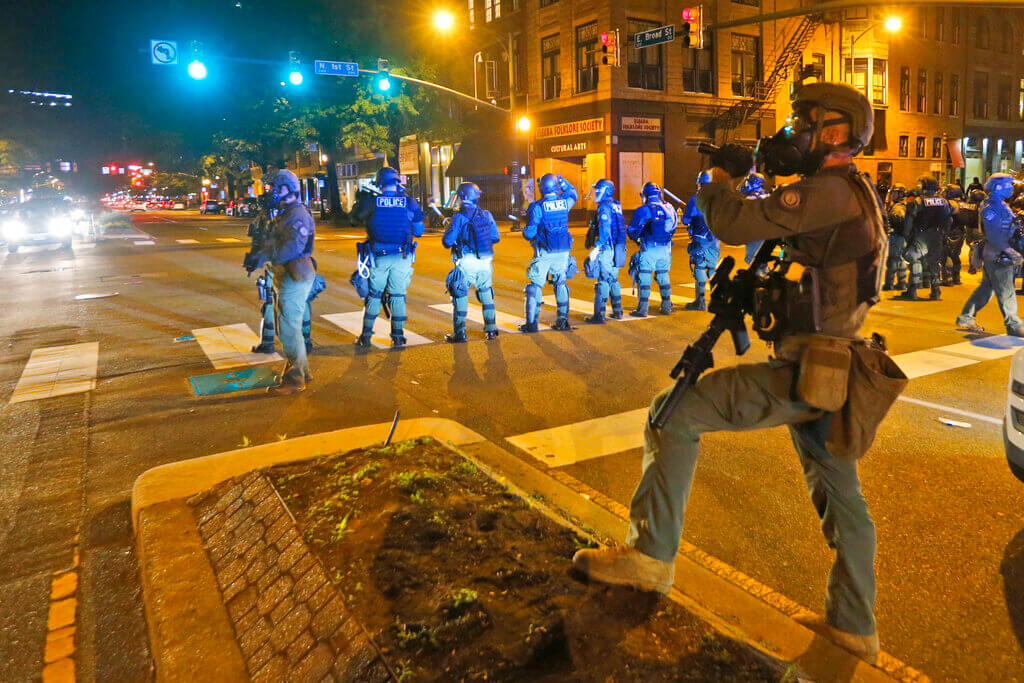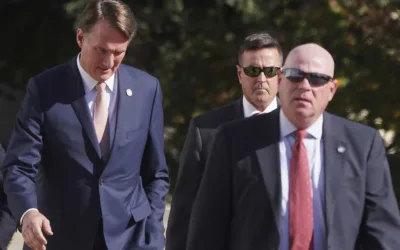
Police secure an intersection in Richmond, Va. Protests continue across the country over the death of George Floyd, a black man who died after being restrained by Minneapolis police officers on May 25. (AP Photo/Steve Helber)
Eliminating chokeholds, establishing civilian review boards, and demilitarizing police are only a few of the proposed reform measures.
Virginia’s General Assembly is in the midst of a special session to retool the state budget after the COVID-19 pandemic. Lawmakers have also made police and criminal justice a top priority, in response to the numerous killings of unarmed Black people by police across the country, including George Floyd, who was killed in March by a Minneapolis police officer.
Here is a breakdown of the legislation still up for discussion by lawmakers during the special session.
Civilian Review Boards
HB 5055 This bill would require all Virginia localities to establish a civilian review panel that will hold police officers accountable and increase transparency at local law enforcement agencies, using guidelines developed by the Department of Criminal Justice Services. If passed, localities would have until July 1, 2021 to create the panels.
SB 5035 If passed, this bill would allow the creation of civilian review boards that would be allowed to do the following:
- Receive, investigate, and issue findings on complaints from civilians regarding conduct of law-enforcement officers and civilian employees
- Investigate and issue findings on incidents, including the use of force by a law-enforcement officer, death or serious injury to any person held in custody, serious abuse of authority or misconduct, allegedly discriminatory stops, and other incidents regarding the conduct of law-enforcement officers or civilian employees
- Make binding disciplinary determinations in cases that involve serious breaches of departmental and professional standards
- Investigate policies, practices, and procedures of law-enforcement agencies and make recommendations regarding changes to such policies, practices, and procedures
- Review all investigations conducted internally by law-enforcement agencies and issue findings regarding the accuracy, completeness, and impartiality of such investigations and the sufficiency of any discipline resulting from such investigations
- Request reports of the annual expenditures of law-enforcement agencies and make budgetary recommendations
- Make public reports on the activities of the board
- Undertake any other duties as reasonably necessary for the board to effectuate its lawful purpose to effectively oversee the law-enforcement agencies as authorized by the locality.
The bill provides that a law-enforcement officer who is subject to a binding disciplinary determination may file a grievance requesting a final hearing pursuant to the locality’s local grievance procedures. The bill also repeals the Law-Enforcement Officers Procedural Guarantee Act.
Complaints Against Officers
HB 5044: This bill would streamline the time limit requirements for citizen complaints against law enforcement and require them to be consistent with standards from the Commission on Accreditation of Law Enforcement Agencies.
Demilitarizing the Police
HB 5049: This legislation would limit law enforcement agencies in Virginia from using and acquiring military property. The bill specifically says no state or local law-enforcement agency shall acquire, purchase, or otherwise accept the following:
- Weaponized unmanned aerial vehicles
- Aircraft that are configured for combat or are combat-coded and have no established commercial flight application
- Grenades or similar explosives or grenade launchers
- Standard-issue military rifles
- Armored, multi-wheeled vehicles that are mine-resistant, ambush-protected, and configured for combat from a surplus program operated by the federal government.
These restrictions do not apply to the Virginia National Guard or Virginia Defense Force.
The bill prohibits the use of such military property by a law-enforcement officer unless a waiver has been granted by the Department of Criminal Justice Services.
The bill also prohibits the use of “kinetic energy munitions,” which includes impact rounds and baton rounds, such as rubber batons, bean bag rounds, foam baton rounds, and plastic, wax, wood, or rubber-coated projectiles. The bill directs the Department to adopt emergency regulations to implement the provisions of the bill.
Elimination of Chokeholds
HB 5069 If passed, this bill would make the use of neck restraints from law enforcement as a felony.
The bill describes a “neck restraints” as the use of any body part or object to attempt to control or disable a person by applying pressure against the neck, with the purpose, intent, or effect of controlling or restricting the person’s movement or restricting the person’s blood flow or breathing, including chokeholds, carotid restraints, and lateral vascular neck restraints.
Law Enforcement Training Standards
HB 5063: House Bill 5063 would eliminate the Committee on Training under the Criminal Justice Services Board that currently serves as the policy-making body responsible for the minimum training standards for law-enforcement officers, deputy sheriffs, jail and correctional officers, and dispatchers and gives those responsibilities to the Director of the Department of Criminal Justice Services.
HB 5076: If passed, House Bill 5076 would change the minimum qualifications of becoming a police officer, making it a requirement that you cannot have been convicted, pled guilty or pled no contest to any misdemeanor involving “moral turpitude” for the last three years.
Marijuana and Traffic Infractions
SB 5029 If passed, this bill would change the level of offense for marijuana possession during a traffic infraction. Senate BIll 5029 would change the possession of marijuana from a primary offense to a secondary offense if they’re operating a motor vehicle with or without the following:
- Without a light illuminating a license plate
- Without an exhaust system that prevents excessive or unusual levels of noise
- With certain sun-shading materials and tinting films
- With certain objects suspended in the vehicle
A secondary offense is one for which a summons can only be issued if the offender is stopped for another, separate offense.
The bill also requires that law-enforcement officers are no longer allowed to search or seize any person, place, or thing solely on the basis of the odor of marijuana. No evidence discovered or obtained as a result of such unlawful search or seizure shall be admissible in any trial, hearing, or other proceeding.

Here’s everything you need to know about this month’s Mercury retrograde
Does everything in your life feel a little more chaotic than usual? Or do you feel like misunderstandings are cropping up more frequently than they...

VIDEO: Check out Dogwood’s new merch line
Big news, Virginia! We've officially launched our Dogwood merch line 🎉 This year, we celebrate 5 years of bringing you Virginia news you can use....

VIDEO: Your support matters!
Your support matters! Donate today. @vadogwoodnews Your support matters! Visit our link in bio to donate today. #virginianews #virginia #community...

Op-Ed: Virginia’s new Democratic majorities pass key bills to improve your lives, but will Youngkin sign them?
The 2024 Virginia General Assembly regular session has wrapped up. It was a peculiar session from the outset, with Democratic majorities in the...

From the state rock to the state flower, here’s how Virginia got its symbols
Have you ever wondered why the Dogwood is the state flower? Or how the cardinal became the state bird? We’re here to answer those questions and more...

VIDEO: Second-gentleman Douglas Emhoff gives speech on reproductive freedom
Second gentleman, Douglas Emhoff touched on reproductive freedom not only being a woman's issue but "an everyone's issue" during the Biden-Harris...




